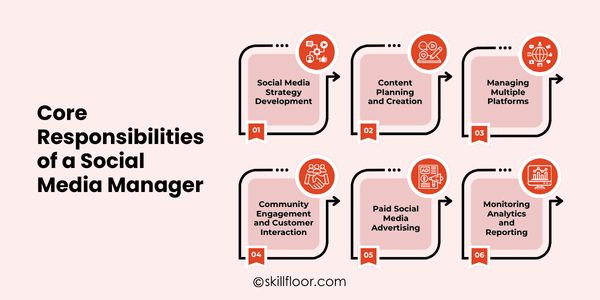Social Media Manager Job Responsibilities
Struggling to manage social media effectively? A social media manager handles strategy, engagement & content to boost brand growth. Find out how.

How has social media evolved into such an effective business tool in the modern era? It helps companies expand and is more than simply a way to interact with friends. A social media manager runs advertisements, engages with followers, analyzes data, and produces interesting content. They remain abreast of trends, guaranteeing that companies gain credibility, draw in customers, and maintain their lead.
Many people believe that social media management is as simple as uploading photos, but it requires preparation and strategy. Without experience, companies risk poor reputations, wasted advertising budgets, and low engagement. By developing clever plans, evaluating information, and maintaining a robust and efficient online presence for the company, a social media manager guarantees success.
Today's internet world is all about trust. Brands that are responsive, honest, and interesting resonate with consumers. By managing comments, upholding transparency, and preserving brand reputation, a social media manager contributes. Businesses may increase client loyalty, establish a strong online presence, and boost credibility with astute digital marketing.
Importance of Social Media in Today’s Digital Marketing Field
-
Building Brand Awareness: Businesses are currently depending heavily on social media to engage with their audience and increase brand recognition, which helps them expand in a competitive sector.
-
Sharing Engaging Content: It enables companies to broadcast interesting content, such as blog posts and videos, that may draw viewers in and entice them to engage with the company.
-
Targeted Advertising: Businesses may target certain audiences with tailored advertising, making sure that the people who are most likely to convert to their message are the ones who see it.
-
Real-Time Communication: Social media facilitates real-time contact, which enables companies to interact with their audience right away, addressing issues and providing answers to increase client happiness.
-
Staying Ahead of Trends: By providing insights on what's successful in the sector, it also assists companies in staying ahead of competitors and trends.
-
Learning Social Media Strategies: If you want to learn more about social media strategies, a digital marketing course can provide you the skills you need to use this important marketing tool.
The Role of a Social Media Manager (SMM)
Developing a brand's online presence is mainly the responsibility of a social media manager (SMM). To guarantee engagement and expansion, they provide content, communicate with followers, and monitor performance. They do more than just post; they create plans that assist companies target the correct audience and maintain their competitiveness in the online market.
Businesses require skilled management to distinguish out in the era of social media marketing. A competent SMM makes sure that the material is interesting, answers questions from customers, and evaluates data to enhance outcomes. They assist companies in gaining credibility, boosting exposure, and achieving long-term success by keeping abreast of trends and platform modifications.
Why Social Media Managers Are Important for Business Growth
-
Maximizes Advertising Efficiency: Social media managers help businesses obtain the most return on investment (ROI) while efficiently reaching potential consumers by optimizing paid advertisements and targeting certain demographics.
-
Improves Customer Support: By providing exceptional customer service, they handle consumer complaints and questions on social media, guaranteeing prompt replies and enhancing brand perception.
-
Monitors Competitors: Social media managers assist companies remain ahead of the competition and improve their strategy by monitoring the actions of competitors.
-
Tracks Market Trends: They keep abreast of changes and trends in the industry, modifying the brand's social media tactics to suit the tastes and interests of the target audience.
-
Increases Lead Generation: Social media managers create campaigns that target prospective clients and collect quality leads, which helps businesses in growing their audience and creating new growth prospects.
-
Enhances Brand Consistency: They help to create a unified and expert online presence that draws in more followers by ensuring the brand's messaging, tone, and visual components are consistent across all platforms.
Core Responsibilities of a Social Media Manager
1. Social Media Strategy Development
Posting content is not the only aspect of social media management. The secret to success is a carefully thought-out plan. A social media manager creates a plan that complements the goals of the business and makes sure that each post has a distinct function. This is involved in:
-
Setting Goals: Clearly define your objectives, such as raising engagement, generating leads, and brand recognition. These goals help you measure your progress and direct your social media approach.
-
Understanding Audience Personas: Learn the hobbies, ages, and online habits of your audience. Better engagement and more meaningful interactions are possible when information is tailored to certain personalities.
-
Competitor Analysis & Market Research: Find out what your competitors are posting on social media. To properly target your audience and stand out, you must be aware of their advantages and disadvantages.
2. Content Planning and Creation
Social media content creation is more than just posting frequent updates. Every post needs to resonate with the intended audience and support the company's mission. A content strategy is planned by a social media manager and consists of:
-
Developing a Content Calendar: Use a content calendar to plan your content in advance. This guarantees timely postings, helps you stay consistent, and lets you match information to forthcoming promotions or events.
-
Crafting Engaging Posts: Posts should be attention-grabbing and interactive. To keep your audience interested and involved, use a variety of text, pictures, videos, reels, and infographics.
-
Aligning Content with Brand Voice: Make sure the tone and values of the business are reflected in each post. Maintaining a consistent message helps you create a powerful, identifiable brand that appeals to your target market.
3. Managing Multiple Platforms
Managing several social media channels calls for a different strategy for each one. To make sure that content on Facebook, Instagram, LinkedIn, TikTok, and other platforms appeals to the target demographic, a social media manager creates a platform-specific strategy. This comprises:
-
Platform-Specific Content Strategy: Every social media platform wants a different strategy. Adapt content to the audience and functionality of social media platforms such as Facebook, Instagram, LinkedIn, Twitter, TikTok, and others.
-
Adapting to New Trends: Social media is continually changing. To maintain interesting and engaging content, a social media manager keeps abreast of shifts in platforms, trends, and new algorithms.
-
Scheduling and Automation Tools: By scheduling articles ahead of time with platforms like Buffer or Hootsuite, you can save time and ensure regular content delivery while still interacting with your audience in real time.

4. Community Engagement and Customer Interaction
Building relationships on social media is more relevant than merely spreading messages. A social media manager places a high priority on interacting with followers to build lasting relationships, which is in line with the fundamentals of social media marketing for long-term success. This includes:
-
Responding to Comments, Messages, and Mentions: Responding quickly shows your regard for your audience. Building a solid relationship with followers and potential customers is facilitated by responding to direct messages, comments, and mentions.
-
Building Relationships with Followers: Regularly interact with your audience. By providing insightful responses and distributing worthwhile content, you gain followers' confidence and convert them into loyal brand supporters.
-
Handling Negative Comments or Crises Professionally: Respond professionally and empathetically to criticism. Calmly handling complaints demonstrates your brand's attention and may help make a negative circumstance better.
5. Paid Social Media Advertising
Setting a budget is only one aspect of running successful paid social media ads. Campaigns created by a social media manager target the appropriate audience and are in line with corporate objectives. That comprises:
-
Running Ad Campaigns: Use social media sites like Facebook, Instagram, and LinkedIn to create targeted advertisements that advertise goods and services. To get the most impact, customize the campaign to appeal to your desired audience.
-
Targeting the Right Audience: Concentrate on the appropriate individuals by focusing on particular groups, hobbies, and habits. Spending your money wisely for better outcomes is ensured by optimizing your ad expenditure.
-
A/B Testing and Analytics: To determine which ad versions work best, test them out. Track success, modify tactics, and constantly enhance upcoming campaigns with analytics to get greater results.
6. Monitoring Analytics and Reporting
Success on social media is more than simply posting often; it also involves realizing the results of your work. To gauge the performance of campaigns and improve tactics, a social media manager uses analytics. That comprises:
-
Tracking Key Metrics: To determine where changes are needed and how effectively campaigns are doing, a social media manager monitors key performance indicators such as engagement rate, reach, and conversions.
-
Creating Reports: A social media manager analyzes the effectiveness of campaigns by producing thorough reports. These studies shed light on the tactics that are effective and point out areas that require development.
-
Adjusting Strategies: In order to maximize future campaigns, plans are modified in light of data findings. Sustained observation guarantees that social media endeavors are consistently in line with Social Media Objectives and yield improvements.
Skills Required to Succeed as a Social Media Manager
-
Strong Communication Skills: Crafting captivating posts and communicating with followers require clear communication in order to ensure that the brand's message is understood and that deep relationships are made.
-
Creativity: Creative, original content is what social media is all about. Social media managers need to constantly think of creative ways to create attention-grabbing posts, campaigns, and images.
-
Analytical Thinking: Reaching corporate objectives and enhancing performance need the ability to evaluate social media analytics, understand information, and modify plans as necessary.
-
Time Management: Excellent time management is necessary to maintain consistency and efficiency in everyday chores, such as scheduling content, managing multiple platforms, and communicating with followers.
-
Adaptability: Social media algorithms and trends are always evolving. When it comes to new tools, platform upgrades, and changes in the business, social media managers need to remain adaptable and fast to adjust.
-
Customer Service Skills: Managing consumer questions and comments on social media with tact and compassion is essential to preserving a favorable brand image and encouraging repeat business.
Tools Every Social Media Manager Should Use
-
Hootsuite: Enables you to manage several social network accounts, schedule posts, and track engagement all from one location, saving you time and maintaining organization.
-
Buffer: Good for planning content, monitoring interaction, and evaluating social media performance on several platforms to guarantee efficiency and consistency.
-
Canva: An easy-to-use tool for designers who want to produce visually appealing content on social media, ideal for managers who lack sophisticated design expertise.
-
Google Analytics: Provides useful data to optimize ads and gauge effectiveness by tracking user activity and traffic from social media sites.
-
Facebook Ads Manager: Vital for managing, producing, and evaluating Facebook and Instagram advertisements; it offers thorough reports to maximize ad spending and targeting.
-
Sprout Social: An all-inclusive social media tool that helps to increase outcomes across platforms by streamlining social media management through post-scheduling, engagement management, and performance analysis. It improves the overall efficacy of the plan and streamlines workflows.
Businesses must maximize their social media presence to thrive in the modern digital environment. A proficient Social Media Manager's job responsibilities cover everything from creating captivating content to managing focused advertising efforts. They support businesses' online growth and success by studying performance data and comprehending audience behavior. It is impossible to stress the value of having a great online presence, and a Social Media Manager's Job responsibilities include keeping up with trends and making sure the brand's voice is consistent. A social media manager is essential to increasing brand awareness and sustaining consumer involvement if they have the appropriate abilities and resources.





























































